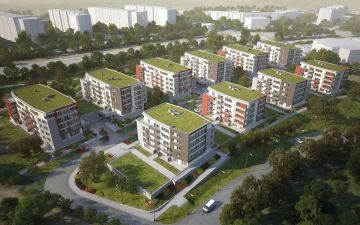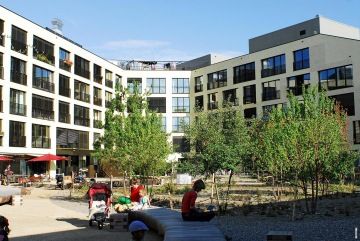THE LIMITS OF ARCHITECTURE – AFFORDABLE HOUSING
Where does architecture begin and end? On what topics should architects be invited and in what social discussions should they be actively involved? These questions led Architects Without Borders to organize a series of public discussions called The Boundaries of Architecture. Two guests who are close to the topic under discussion are invited to one table - one architect or urban planner and an expert from another profession. Together we are looking for the boundaries of architecture and its intersections with other social disciplines.
The topic of Affordable Housing was discussed by sociologist Tomáš Hoření Samec and architect David Mareš.
Sociologist Tomáš Hoření Samec works at the Institute of Sociology of the CAS. He graduated with a PhD in Sociology
at the Faculty of Social Sciences of Charles University and a research internship at the University of Vienna. He focuses on discourse research on housing and new forms of housing provision by public and collective actors. He has published in international journals such as Urban Studies, Journal of Cultural Economy and Housing, Theory and Society. He is the editor of the publication "How to provide affordable housing?", which is available at available on the website dostupnebydleni.soc.cas.cz.
Architect David Mareš is a graduate of the Faculty of Architecture at the VUT in Brno. In 2003, he founded the atelier třiarchitekti together with Michal Fišer, which they have been running together ever since. He has completed projects of all scales (from the reconstruction of an apartment to urban planning). He has long been promoting the idea of the Baugruppe and aims to create the first project of this type in Prague.
Description of the current situation and explanation of the causes
The number of people who register their permanent residence in Czech cities is growing by 0.4% annually. An estimated additional 0.4% move to cities without registering, which in total over the last 5 years amounts to approximately 52,000 people (source: Stav a pohyb obyvatelstva v ČR - rok 2019).
This growth, according to Tomáš Hoření Samec, raises the need to build 6-7 thousand apartments per year, but only about 1400 are actually built. Other apartments are used for short-term housing such as Airbnb or speculation. Apartment prices and rents have increased by tens of percent over the last 3 years, while real wages have only increased by units of percent.

The opening scissors in the property market threaten newcomers to the market (young people, broken families after divorce) and socially disadvantaged groups. Opposite them are owners, among whom are many residents who benefit from the rise in rent prices. The unsustainable situation creates a gap in society and inefficiency, with many apartments vacant.
In spring 2019, the Pirate Party wanted to prepare an analysis of the number of empty apartments in Prague using data on electricity consumption. However, this initiative has been accused of interfering with privacy and property rights.
Tomáš Hoření Samec said that there are only about 30 000 municipal housing units in Prague that belong to the municipality or municipal districts, which is enough for only 5% of the population. As the architect David Mareš mentioned, this amount has no real influence on the market, so in order to influence the prices of flats, 30% of them would have to be regulated. Given the low number of municipal flats and the great variability of the rules for obtaining them, this is not a sufficient solution.
According to David Mares, an increase in new construction cannot be expected and explains the reasons for this situation, such as the lengthy two-stage construction procedure for developers (on average 10 years), in which legislative deadlines in the construction procedure are not respected. Furthermore, construction is blocked by a lack of building land and many areas are subject to building closures, e.g. the Nákladové nádraží Žižkov and Bubny.

"We're really in a situation now where housing prices are out of reach for the middle class."
— Tomáš Hoření Samec —
If sufficient housing were built, would it lead to better housing affordability? No, affordable housing needs to be built. But how?
Housing alternatives
David Mares thinks that affordable housing is housing for which the user gives no more than 30% of his net income. In both Vienna and Berlin you can get a cheaper rental apartment than in Prague, while incomes there are several times higher.
Anyone who spends more than 30% of their net income on housing is entitled to a housing allowance (35% in Prague). However, a tenth of households paying more than 40% do not apply for this allowance. This is probably due to the stigma of the benefit or low awareness; there could be room for improvement here.
Alternatives to owner-occupied construction are almost non-existent, the system is not set up for them. Municipalities have privatised most of their flats or have open-ended contracts. In Prague, it is difficult to coordinate municipal housing in a unified way, because the flats are managed by the city districts or the municipality, and they have different procedures in allocating municipal flats. Ownership housing is seen as a security and an investment.
Examples from abroad and recommendations for change
In the German-speaking countries, the principle of the Baugruppe is widespread (you can read more in the manual written by IPR), which prevents speculation in apartments and excludes them from the profit-based system. It is a civic initiative of people who want to secure shared housing on the principle of participation, finding a common path and creating a community that positively influences its surroundings. Properties built in this way often have shared community spaces such as clubhouses or laundry rooms and are affordable due to the absence of developer profit.

Baugruppe are supported by the public sector abroad in various ways – in spatial plans, urban visions, or financially (e.g. a favourable lease of land that the state or city will not lose).
"I have been trying unsuccessfully to implement the Baugruppe project in the Czech Republic for 15 years."
- David Mareš -
There is no Baugruppe institute anchored in the Czech legislation, probably the closest is the subject of cooperatives or communities of units, but they operate on different principles. In our conditions it would be problematic to finance buildings, banks do not recognise the Baugruppe principle, cities and the state do not support them, the concept does not address long construction procedures or land availability.